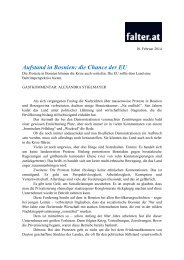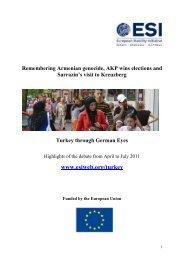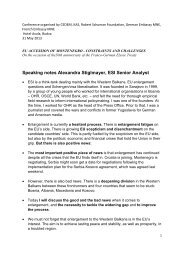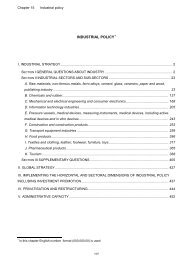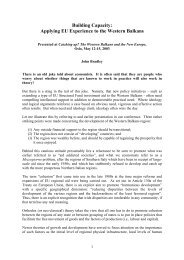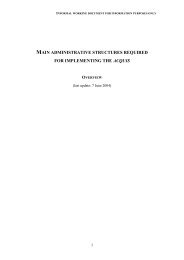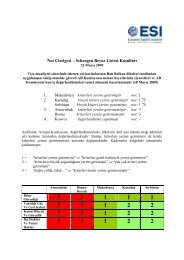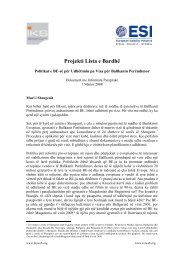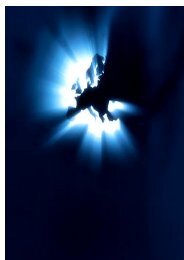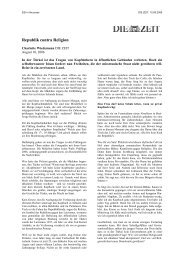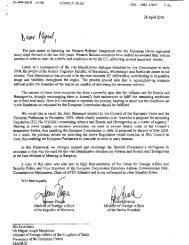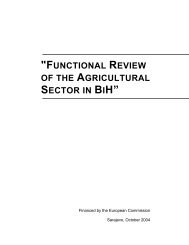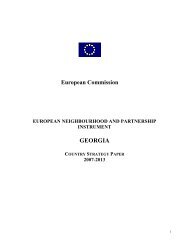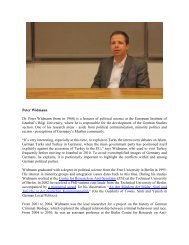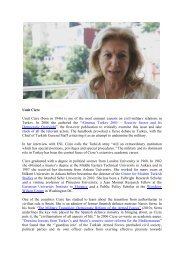Gender Assessment for USAID/Caucasus/Azerbaijan
Gender Assessment for USAID/Caucasus/Azerbaijan
Gender Assessment for USAID/Caucasus/Azerbaijan
Create successful ePaper yourself
Turn your PDF publications into a flip-book with our unique Google optimized e-Paper software.
V. “<strong>Gender</strong>” Activities of NGOs and Public Institutions<br />
The only <strong>Azerbaijan</strong> public institution that has a specific “gender” function is the State<br />
Committee on Women’s Affairs with representatives from each Ministry except the<br />
Ministry of Health. The Committee leadership includes a progressive Deputy Chair,<br />
Mominet Omarova, who has been working closely with the Council of Europe on<br />
improving gender equality through equal opportunities legislation. <strong>Azerbaijan</strong>’s first<br />
Ombudsman is a woman, but the position covers a broad range of issues, with women<br />
being only one of many.<br />
Donor coordination in <strong>Azerbaijan</strong> is ad hoc. Thus, there is no existing gender working<br />
group or subcommittee through which donors could coordinate their ef<strong>for</strong>ts. The Open<br />
Society Institute has a Network Women’s Program lead by Gulnara Mamedova. One of<br />
their main activities is a gender education project in secondary and higher education. The<br />
World Bank’s Operations Manager, Saida Bagirova, has a strong interest in gender<br />
issues; the Bank is considering doing a country-wide gender assessment in accordance<br />
with their gender mainstreaming policy. The UNDP has a gender point person, currently<br />
Nurana Abassova, but currently has no gender projects. UNIFEM has a special <strong>Caucasus</strong><br />
project on “Women <strong>for</strong> Conflict Prevention and Peace Building” working mostly in some<br />
border areas. The final conference was held in Baku October 25th, but funding <strong>for</strong> a<br />
small follow-on project is expected. The Democracy Commission, which funds two grant<br />
cycles a year, includes gender as one of its themes <strong>for</strong> projects to fund.<br />
Un<strong>for</strong>tunately, many of the NGOs that work on women’s and/or gender issues have an<br />
antagonistic attitude toward each other, limiting the amount of coordination and<br />
collaboration among them. This situation is exacerbated by competition <strong>for</strong> <strong>for</strong>eign donor<br />
resources. Below is a selected list of NGOs that are involved in women’s or gender<br />
issues, including those collected by Elchin Gulieyev of the Program Office:<br />
• Women Rights Protection Society “D. Aliyeva”<br />
• Association of Creative Women<br />
• <strong>Azerbaijan</strong> Feminist Group<br />
• <strong>Azerbaijan</strong> <strong>Gender</strong> Association “Symmetry”<br />
• <strong>Azerbaijan</strong> Women and Development Center<br />
• <strong>Azerbaijan</strong> Women’s Society<br />
• Baki Association of <strong>Azerbaijan</strong> Women<br />
• Charity Center “Havva”<br />
• Charitable Enlighteners Women of <strong>Azerbaijan</strong><br />
• “Clean World” Social Union <strong>for</strong> Civil Rights<br />
• For Equal Rights and Opportunities Disabled Women’s Society<br />
• <strong>Gender</strong> Research Center<br />
• Public Union of Women “Gaygi”<br />
• Sevil Medjilis of <strong>Azerbaijan</strong> Women<br />
• Sona Meshketian Turks Women and Children’s Organization<br />
• Women Consulting and Prophylaxis Center<br />
• Women in the Oil Industry <strong>Azerbaijan</strong><br />
• Women’s Crisis Center<br />
DevTech Systems, Inc. 17 <strong>USAID</strong>/<strong>Caucasus</strong>/<strong>Azerbaijan</strong><br />
<strong>Gender</strong> <strong>Assessment</strong>



